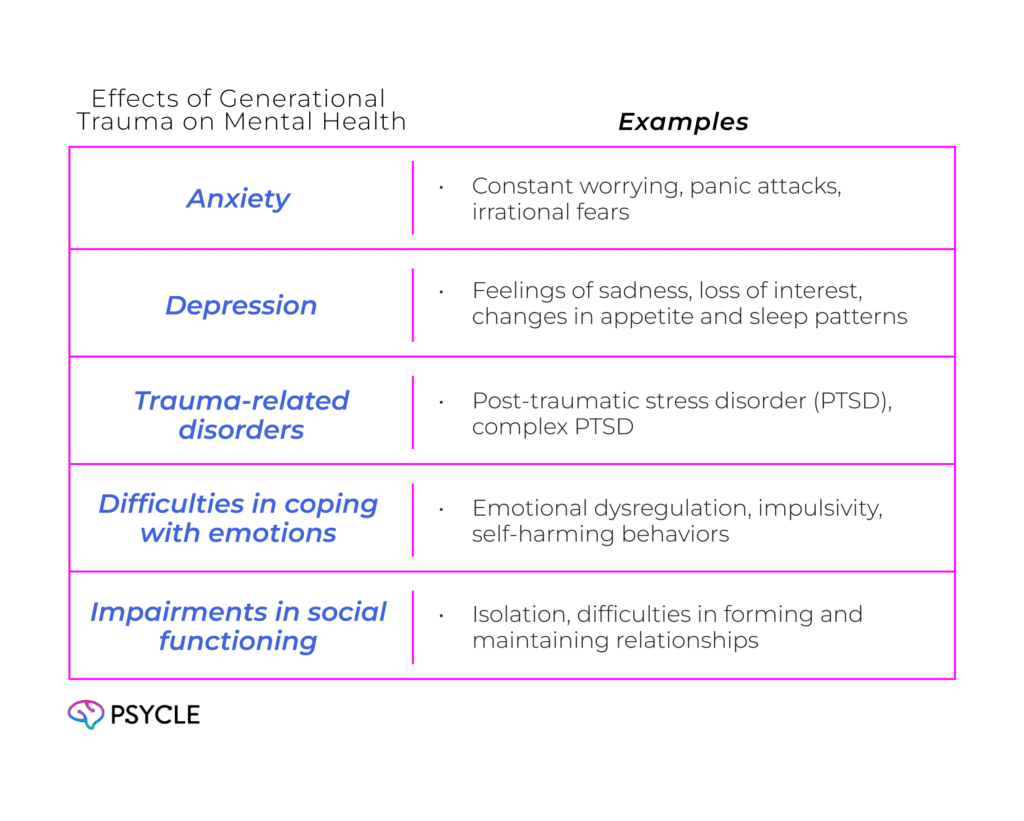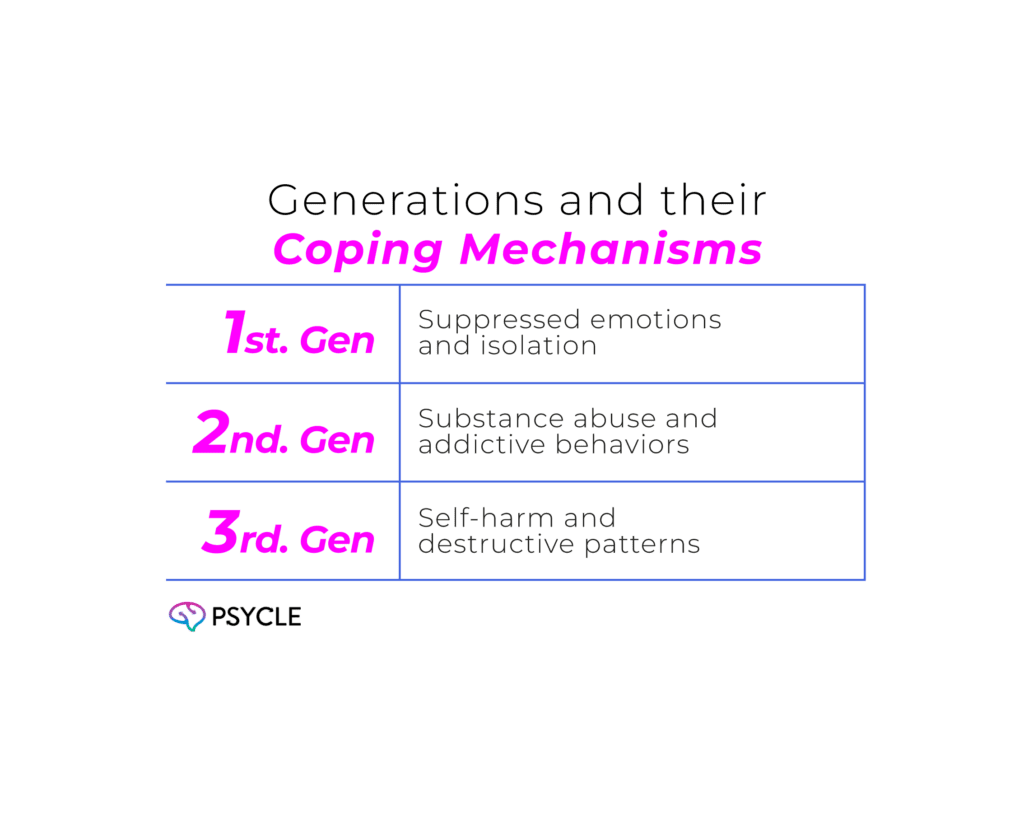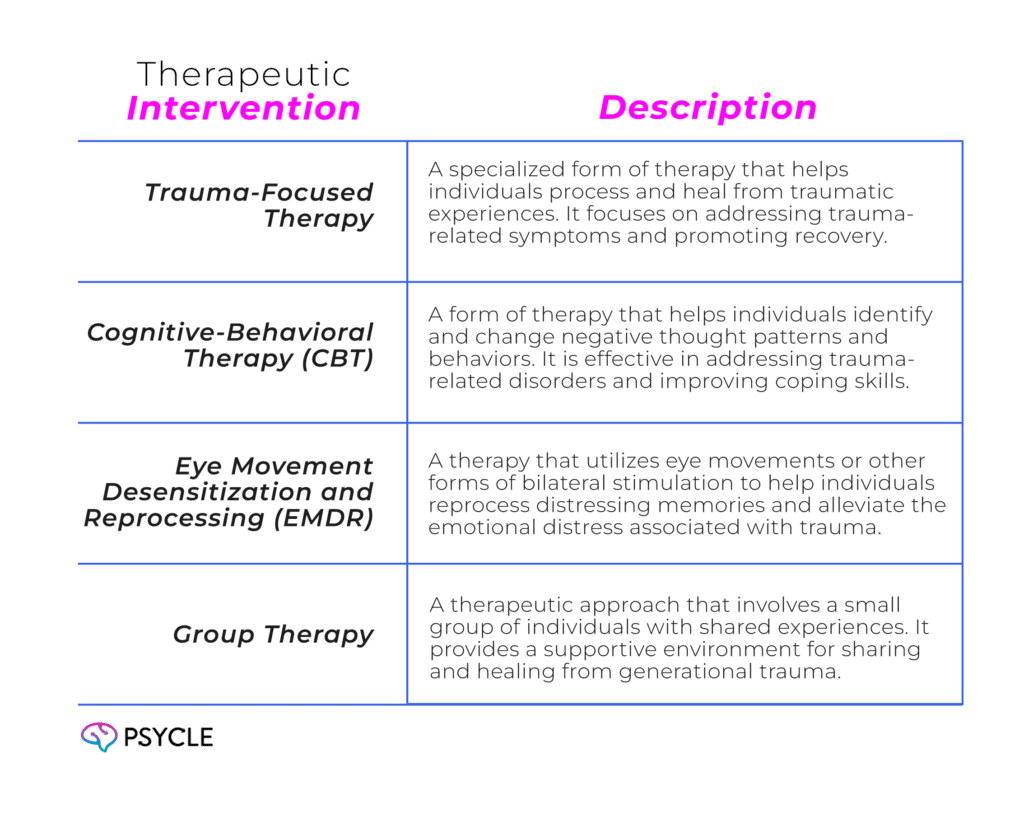Generational trauma refers to the transmission of trauma experiences and their effects across multiple generations within a family or community. It can manifest in various ways, impacting the mental health and relationships of individuals.
Understanding the signs of generational trauma is crucial for identifying and addressing its effects. Healing and breaking the cycle of generational trauma requires therapeutic interventions and support. Here’s an overview of what generational trauma looks like, including how it can impact people and families.
Key Takeaways
- Generational trauma involves the transfer of trauma experiences and their effects across generations.
- It can impact the mental health and relationships of individuals and families.
- Recognizing the signs of generational trauma is essential for addressing its effects.
- Healing and breaking the cycle of generational trauma require therapeutic interventions and support.
- Seeking therapy is a crucial step in the healing process.
Defining Generational Trauma
Generational trauma, also known as intergenerational trauma, refers to the transfer of traumatic experiences and the resulting effects from one generation to the next. It can occur within families, communities, or cultural groups.
The transmission of trauma can be influenced by various factors, including family dynamics, cultural beliefs, and societal structures. Traumatic events, such as war, genocide, displacement, or systemic oppression, can also leave a lasting impact on individuals and subsequent generations. Family dynamics also play a crucial role in the transfer of generational trauma. Traumatic experiences can affect the parent-child bond, leading to attachment difficulties and emotional dysregulation.
Historical traumas, such as racial discrimination, slavery, or mass violence, can have a significant impact on subsequent generations. The experiences and collective memories of past traumas inform the beliefs, behaviors, and coping mechanisms of individuals within these communities.
Cultural beliefs and practices also contribute to the transmission of trauma. Communities affected by historical traumas may develop specific coping mechanisms, rituals, or narratives that shape their collective responses to trauma. These cultural factors can perpetuate the impact of generational trauma and influence the way individuals understand and cope with their experiences.
The Interplay of Generational Trauma and Mental Health
Generational trauma can have profound effects on mental health. Individuals impacted by generational trauma may experience higher rates of anxiety, depression, post-traumatic stress disorder (PTSD), and other trauma-related disorders. The psychological impact of generational trauma can manifest in various ways, including maladaptive coping mechanisms, difficulty regulating emotions, and impaired self-esteem.
The intergenerational transmission of trauma can also influence the development of resilience and risk factors within families. The experiences of trauma and the resulting coping mechanisms learned from previous generations can impact individuals’ ability to adapt and thrive.
Research has shown that the presence of generational trauma can increase vulnerability to stress and make it more challenging to cope with emotions effectively. Individuals may struggle with regulating their emotions, leading to difficulties in maintaining healthy relationships and achieving overall well-being. If left untreated, the psychological effects of generational trauma can persist across multiple generations, perpetuating a cycle of distress and suffering.
Mental health professionals recognize the importance of trauma-informed care when working with individuals who have experienced generational trauma. This approach emphasizes compassion, safety, and empowerment in supporting individuals’ healing journeys.
Recognizing Manifestations of Generational Trauma
Generational trauma can manifest in various ways, and recognizing the signs is crucial for identifying its presence. Individuals who have not directly experienced the initial traumatic event may still display symptoms influenced by their family’s collective trauma. The following are common signs and symptoms of generational trauma:
- Anxiety: Experiencing excessive worry, fear, and restlessness.
- Depression: Feeling persistent sadness, loss of interest, and lack of energy.
- Post-traumatic stress disorder (PTSD): Experiencing flashbacks, nightmares, and intrusive thoughts related to the trauma.
- Substance abuse: Engaging in excessive alcohol or drug use as a coping mechanism.
- Behavioral problems: Displaying aggression, impulsivity, and self-destructive behaviors.
- Difficulties in regulating emotions: Struggling to manage and express emotions effectively.
Recognizing these patterns of behavior and emotional distress can help individuals and their loved ones understand and address the presence of generational trauma. Through this awareness, steps can be taken towards healing and breaking the cycle of trauma.

Recognizing and understanding the psychological effects of generational trauma is the first step towards healing. With the right support and treatment, individuals can break the cycle of intergenerational trauma, promote mental well-being, and pave the way for a healthier future.
Impact of Generational Trauma on Relationships
Generational trauma can have far-reaching effects on relationships within families and communities. The unresolved trauma from previous generations can shape the dynamics between parents and children, as well as between siblings and extended family members. These effects can permeate various aspects of relationships, including communication patterns, trust issues, and emotional availability.
One significant impact of generational trauma is the disruption of family dynamics. Traumatic experiences can create imbalances in power, resulting in unhealthy dynamics such as overprotectiveness, enmeshment, or detachment. These dynamics can hinder the development of secure and authentic relationships within the family unit.
The Role of Communication
Communication patterns within families affected by generational trauma can also be greatly impacted. Open and honest communication is essential for healthy relationships, but trauma can interfere with the ability to express and understand emotions effectively. Individuals may struggle with expressing their needs and emotions, leading to misunderstandings, conflicts, and a breakdown in communication.
Challenges in Intergenerational Relationships
Intergenerational relationships, such as those between parents and children, can be particularly affected by generational trauma. Children who grow up in families impacted by trauma may experience difficulty in forming healthy attachments, leading to challenges in their relationships later in life. They may struggle with intimacy, vulnerability, and emotional regulation, resulting in strained connections with their parents or caregivers.
Additionally, the effects of generational trauma can extend to relationships between siblings and other extended family members. Disruptions in family dynamics and communication patterns can create conflicts and distance between relatives, making it difficult to foster supportive and connected relationships.
Recognizing the impact of generational trauma on relationships is the first step towards healing and improving family dynamics. By creating awareness of the effects of trauma, individuals and families can seek professional help, develop coping strategies, and work towards establishing healthier communication patterns and building trust.
Healing from generational trauma requires patience, empathy, and a commitment to breaking the patterns of the past. Through therapy and other supportive interventions, individuals can learn to navigate the challenges caused by generational trauma and create spaces for healing, growth, and stronger relationships.
Tracing Family Patterns and History
Understanding the history of trauma within a family is crucial for recognizing the presence of generational trauma. By tracing family patterns, we can gain insights into the intergenerational behaviors, beliefs, and coping mechanisms that have been passed down through the generations. This exploration helps individuals establish connections between their own experiences and those of their ancestors, fostering a deeper understanding of their struggles and the potential for healing.
Uncovering Family History
To trace family patterns, it is essential to delve into family history. This involves gathering information, such as stories, anecdotes, and historical records, that shed light on past experiences and events. Documenting this information can help uncover the intergenerational impacts of historical trauma on families.
Identifying Intergenerational Patterns
Examining intergenerational patterns is a key part of understanding the transmission of trauma within families. By looking at how certain behaviors, beliefs, and coping mechanisms are repeated across generations, we can identify the influence of historical trauma on our family dynamics.
Here is an example of intergenerational patterns in coping mechanisms:

Healing and Breaking the Cycle
Tracing family patterns helps individuals recognize the impact of generational trauma and offers an opportunity for healing. By acknowledging these patterns, individuals can actively work towards breaking the cycle of intergenerational trauma through therapy, self-reflection, and embracing healthier coping mechanisms.
Understanding our family history empowers us to make informed choices and break free from the limitations imposed by historical trauma. It allows us to create a brighter, more resilient future for ourselves and future generations.
Breaking the Cycle of Generational Trauma
Breaking the cycle of generational trauma requires a comprehensive approach that includes therapeutic interventions, support networks, and individual resilience. Healing from generational trauma involves addressing the emotional and psychological impact of trauma, seeking professional help when needed, and engaging in self-care practices.
Building resilience and adopting healthier coping mechanisms can help individuals and families overcome the effects of generational trauma and create a positive legacy for future generations.
Therapeutic interventions play a crucial role in healing from generational trauma. Options such as trauma-focused therapy, cognitive-behavioral therapy (CBT), or eye movement desensitization and reprocessing (EMDR) can assist individuals in processing and overcoming the effects of trauma. These evidence-based therapies provide a safe and supportive environment for exploring and addressing underlying issues.
Support networks also play an essential role in breaking the cycle of generational trauma. Connecting with individuals who have had similar experiences can provide validation and understanding. Support groups or community organizations focused on generational trauma can help individuals and families find solace and gather resources for healing.
Individual resilience is a vital factor in breaking the cycle of generational trauma. Cultivating resilience involves developing coping strategies, improving emotional regulation skills, and practicing self-care. By building resilience, individuals can effectively navigate the challenges associated with generational trauma and create a healthier future for themselves and future generations.
By seeking professional help and engaging in therapeutic interventions, individuals can break free from the negative psychological effects of generational trauma and improve their overall well-being.
Therapeutic Interventions for Generational Trauma

Seeking Therapy for Healing
Seeking therapy is an essential step in healing from generational trauma. Therapy provides a safe and supportive space for individuals to explore, understand, and heal from the effects of trauma. One effective approach is trauma-focused therapy. This type of therapy is specifically designed to address the impact of trauma on individuals and help them overcome its effects. Two commonly used trauma-focused therapies are:
- Cognitive-Behavioral Therapy (CBT): CBT focuses on identifying and changing negative thoughts and behaviors associated with trauma. It helps individuals develop coping skills, manage distressing emotions, and improve their overall well-being.
- Eye Movement Desensitization and Reprocessing (EMDR): EMDR utilizes eye movements or other forms of bilateral stimulation to help individuals process traumatic memories and reduce their emotional intensity. It aims to reprocess traumatic experiences and promote healing.
When seeking therapy for generational trauma, it’s important to find a therapist who specializes in intergenerational trauma and trauma-informed care. These therapists have the knowledge and expertise to address the unique complexities of generational trauma and provide appropriate support and guidance.
Therapy offers a range of benefits for healing from generational trauma:
- Creating a safe space: Therapy provides a confidential and nonjudgmental environment where individuals can openly express their thoughts, emotions, and experiences.
- Understanding the impact: Therapists help individuals gain insight into how generational trauma has affected their lives, relationships, and well-being.
- Developing coping skills: Through therapy, individuals learn healthy coping mechanisms to manage stress, regulate emotions, and navigate the challenges associated with generational trauma.
- Breaking the cycle: Therapy empowers individuals to break the cycle of generational trauma by addressing its effects and developing resilience.
Ultimately, therapy plays a vital role in the healing journey from generational trauma. It offers the support, guidance, and tools necessary to overcome the negative impact and create a brighter future.
If you feel like you may be suffering from generational trauma, it’s always recommended to seek professional help. Sites like Brightside offer a free assessment. Just complete their 4-minute questionnaire, and you’ll get a personalized treatment plan and an appointment for a virtual session with a professional in less than 48 hours.

Conclusion
Generational trauma can have a profound and lasting impact on individuals and families. It is crucial to recognize the signs of generational trauma and understand how it affects mental health and relationships. Healing from generational trauma requires a multi-faceted approach, including therapy, support networks, and individual resilience.
By seeking therapy and addressing the effects of generational trauma, individuals and families can break the cycle and create a healthier future. Tracing family patterns and history can provide insights into the intergenerational transmission of trauma, allowing for a deeper understanding of personal struggles and the potential for healing.
It is important to remember that healing takes time and effort, but with the right support and resources, it is possible to break free from the grip of generational trauma and embrace a brighter future.
FAQs
What is Generational Trauma?
Generational trauma refers to the transmission of trauma experiences and their effects across multiple generations within a family or community.
How Do You Recognize the Signs of Generational Trauma?
Signs of generational trauma can manifest in various ways, including anxiety, depression, post-traumatic stress disorder (PTSD), substance abuse, behavioral problems, and difficulties in regulating emotions.
What is the Impact of Generational Trauma on Families?
Generational trauma can significantly impact relationships within families and communities, affecting dynamics, communication patterns, trust, and emotional availability.
How Can Generational Trauma Be Healed?
Healing and breaking the cycle of generational trauma require therapeutic interventions, support networks, and individual resilience.
What are the Effects of Generational Trauma on Mental Health?
Generational trauma can result in higher rates of anxiety, depression, and other trauma-related disorders, along with difficulties in coping with emotions and impairments in social functioning.
How Does Generational Trauma Impact Relationships?
The unresolved trauma from previous generations can affect relationships between parents and children, as well as between siblings and extended family members, leading to difficulties in establishing and maintaining healthy relationships.
How Do You Trace Family Patterns and History to Recognize Generational Trauma?
Tracing family patterns and understanding the history of trauma within a family is essential for recognizing the presence of generational trauma and identifying connections between experiences and those of ancestors.
What is the Importance of Seeking Therapy for Healing From Generational Trauma?
Seeking therapy, such as trauma-focused therapy, is an essential step in healing from generational trauma, providing a safe space to explore, understand, and heal from trauma.

